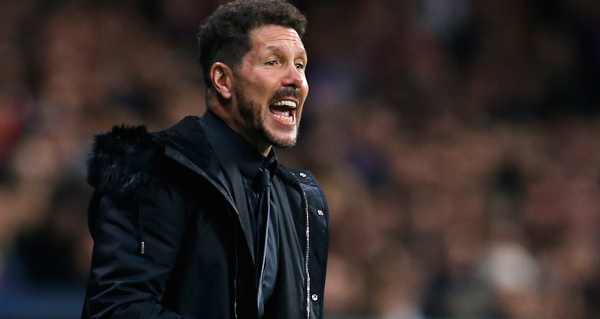Soccer rarely gives you an explanation. Sometimes one team simply wallops another, but when the margins are finer, which they often are, meaning breaks down and you have to admit that, I don’t know man, if the ball had struck the crossbar a couple inches lower in the 66th minute, it likely caroms into the net and the whole match changes from there. It’s a game of very few complete sentences, slow-burning moves concluding in scuffed shots, ordinary punts that lance through the back line, spells where the two teams are just heading the ball to each other in the middle of the park. To the extent the 90 (or more) minutes hang together and cause begets effect, it’s more like experimental than narrative film. You connect the dots in your own way. Tactical analyses, quasi-religious beliefs, This Team Just Wanted It More, etc. Most explanations are valid, if not entirely convincing.
To be intensely literal about it: Marcos Llorente scored the goal that put Atletico Madrid into the lead because Adrian—filling in for the much more technically assured Alisson—screwed up. He was either trying to play the ball to Virgil Van Dijk and mishit it, or he simply didn’t see Joao Felix, who wasn’t pressing so much as pulling out of a sprint after a failed counterattack. Felix took the wayward pass, played Llorente into a decent shooting position at the edge of the box, and Marcos skipped it into the bottom corner.
The second goal, the one that put Atleti firmly ahead, was less explicable. Joe Gomez tried to show Llorente onto his left foot, let him cut back onto his right, and neither Jordan Henderson nor James Milner were able to get a toe in before Llorente fired a striker’s finish past Adrian. Llorente wasn’t able to do this because he’s accustomed to it. He’s a holding midfielder by trade, fashioned recently by Diego Simeone—who would field six holding midfielders if he could—into a right-sided mid who makes powerful runs down the touchline and then kind of doesn’t know what to do with the ball in the final third because he’s not a winger. He’s a terrific athlete whose technical gifts remain largely theoretical due to Atleti’s blunt instrument approach. Anyway, he’s never pulled off anything like that second goal before.
Getting through the second leg was going to take something anomalous from an Atleti player, because Liverpool were Liverpool—which is to say quick, forceful, and adventurous in attack while also being difficult to break against. It cannot be overstated how many good-to-great scoring opportunities the Reds generated while being faced with nothing more dangerous than hopeful 40-yard balls from the opposition. A few chances they squandered; a handful of others were brushed away by Jan Oblak, who despite letting in two goals was about as impressive as it gets between the sticks. Especially in the second half, Liverpool sliced right through Atleti’s left side, Koke offering insufficient cover for Renan Lodi as Mo Salah skated and feinted his way into shooting and crossing positions more or less at will. In the end, the last-ditch six yard box stuff shook out in Atleti’s favor: a save here, a frantic clearance there, Roberto Firmino getting a clean header that he couldn’t quite decide whether to direct on goal or to a teammate. It was the '16 Warriors shooting bushels of semi-contested threes. You’d put your money on them, but sure, there’s always a chance the ball rims out with puzzling regularity. Salah on his left foot in space, anticipation building, and whoosh: he curls it into the fifth row.
Liverpool are going to win the Premier League by a million points because they’re arguably the best team in the world and Atleti currently sit sixth in the La Liga table because Simeone has spent years shaping them into a mechanism that knows what to do with itself only against superior competition—and even then counts on Marcos Llorente to play brilliantly as an auxiliary forward. The latter bouncing the former from the Champions League isn’t colossally shocking—tournament soccer occasionally produces these unlikely outcomes—but the puzzling aspect of the tie is that the return leg at Anfield went pretty much exactly how Jurgen Klopp would have wanted it to go, moment by moment. At each discrete interval—pick a minute before the 97th—Liverpool were doing what they needed to do to come out on top. Dominating possession, driving Atleti into their own box, pulling even before halftime, working Oblak, finally breaking through early in extra time. It was all very intelligible. The match hung together; it made sense, and it said: Atleti are hard to break down, but Liverpool are going to win this.
And then the match got blaringly out of hand. We traveled from Spielberg to Brakhage in the space of a bad pass from Liverpool’s backup keeper and a well-placed shot from Simeone’s fifth-favorite midfielder. You can contextualize that sudden shift however you want, ascribe it meaning that isn’t verifiably real but isn’t refutable either. (Barcelona fans probably have a few ideas relating to the balance of the universe.) There is so much to say and nothing to be said that settles the matter. We’ve got the whole ordeal on tape, and that’s where the truth is, somewhere beyond words, images that follow one after the other and add up only to a feeling.



